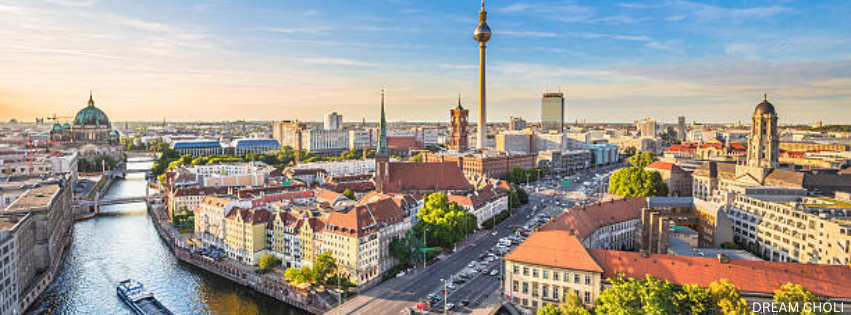
Germany, officially called the Federal Republic of Germany, is a prominent nation in central-western Europe, celebrated for its rich historical legacy, cultural diversity, and strong economic standing. As a leading global power and a core member of the European Union, Germany is highly respected for its engineering expertise and technological achievements. Some of the world’s most renowned automotive brands, including BMW, Mercedes-Benz, and Volkswagen, originated here, solidifying Germany’s reputation for precision engineering and superior-quality products. Germany’s diverse landscape spans from the picturesque coastlines of the North Sea and the Baltic Sea in the north to the dramatic peaks of the Bavarian Alps in the south. The country is also home to vibrant and unique cities, each with its own charm and cultural offerings. Berlin, the capital, is known for its rich history, modern art scene, and iconic sites like the Brandenburg Gate. Munich, in the heart of Bavaria, is famous for its beer culture and hosts the world-renowned Oktoberfest, one of the largest beer festivals globally. Hamburg, with its maritime heritage, is another cultural hub that offers a unique blend of history and modernity.
German cuisine reflects the country’s regional diversity, featuring hearty dishes such as sausages, sauerkraut, pretzels, and, of course, a wide variety of beer. Oktoberfest in Munich is a major attraction for beer enthusiasts worldwide, celebrating Bavarian culture and traditions with lively festivities, music, and traditional attire. Germany has made outstanding contributions to art, music, philosophy, and science. It is the birthplace of influential composers like Beethoven and Bach, as well as groundbreaking thinkers like Albert Einstein and Karl Marx. Architectural and historical landmarks such as Neuschwanstein Castle in Bavaria and the Berlin Wall Memorial add to Germany’s rich cultural heritage, drawing millions of visitors each year. With its blend of historical significance, cultural wealth, economic strength, and commitment to innovation and efficiency, Germany is a remarkable nation that continues to leave a lasting impact on the global stage.
Germany experiences a range of weather conditions throughout the year, adding to its seasonal charm. In the summer months, from June to August, temperatures can become quite warm, typically ranging between 25 to 30 degrees Celsius (77 to 86 degrees Fahrenheit), especially in southern and central Germany. This is a lively time to visit, as cities and towns come to life with festivals, outdoor events, and bustling café scenes. Winter, spanning December to February, brings colder weather, with temperatures often hovering around 0 degrees Celsius (32 degrees Fahrenheit) and occasionally dipping below, especially in the mountainous areas and northern regions. This is an ideal time to visit for those who enjoy cooler weather, as Germany’s famous Christmas markets offer a magical winter experience with festive lights, seasonal treats, and unique holiday crafts.
For travelers seeking milder temperatures and fewer crowds, spring (March to May) and autumn (September to November) are also excellent choices. During spring, blooming flowers and vibrant landscapes make for beautiful sightseeing, while autumn’s changing colors create a scenic backdrop for exploring cities and countryside alike. Ultimately, the best time to visit Germany depends on your preferences. Summer is ideal for warm weather and outdoor activities, while winter offers a cozy atmosphere with traditional Christmas markets. However, keep in mind that popular tourist attractions are often more crowded during peak summer months, so planning ahead can make for a smoother travel experience.
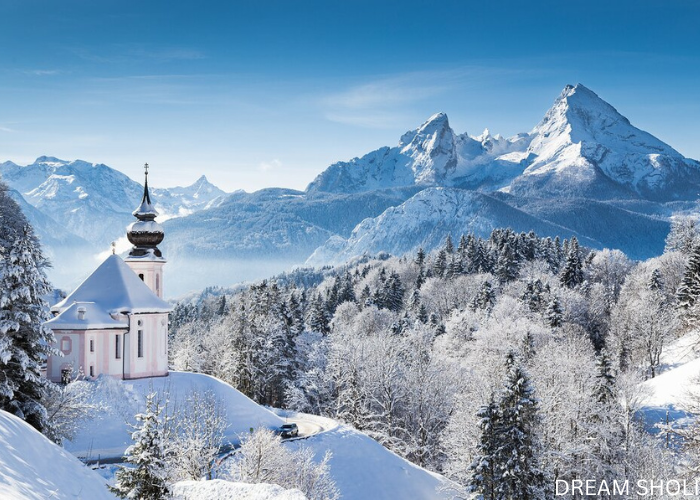
Each area of the country contributes its own unique customs, creating a rich cultural landscape that offers something for everyone. One of the most iconic cultural experiences is the world-famous Oktoberfest in Bavaria. This lively beer festival, celebrated in Munich, draws millions of visitors each year, offering a mix of traditional music, costumes, and, of course, a vast selection of local brews. Germany’s cities, including Berlin and Munich, are steeped in history, boasting stunning architecture that spans medieval, baroque, and modern styles. Berlin, the capital, is particularly renowned for its fascinating blend of contemporary art and historical landmarks such as the Brandenburg Gate and remnants of the Berlin Wall. When it comes to cuisine, Germany is known for its hearty, flavorful fare. Traditional dishes like sausages (particularly bratwurst), sauerkraut, and schnitzel are staples of German cuisine. Each region offers its own variations of these dishes, reflecting local tastes and agricultural traditions. Soft, warm pretzels are an iconic snack, often enjoyed with mustard or cheese. German bread, with over 300 varieties, is a true reflection of the country’s deep baking traditions, while its pastries, such as strudel and black forest cake, offer a sweet end to any meal. In addition to its culinary delights, Germany’s rich cultural fabric is also woven from its long-standing traditions and festivals. From medieval fairs to classical music festivals, the country hosts a wide range of events that celebrate its diverse heritage. Whether it’s the grand opera performances in Dresden, the classical music concerts in Leipzig, or the vibrant Christmas markets that fill the streets with festive cheer, Germany’s cultural scene offers an immersive experience into its traditions, arts, and community spirit.

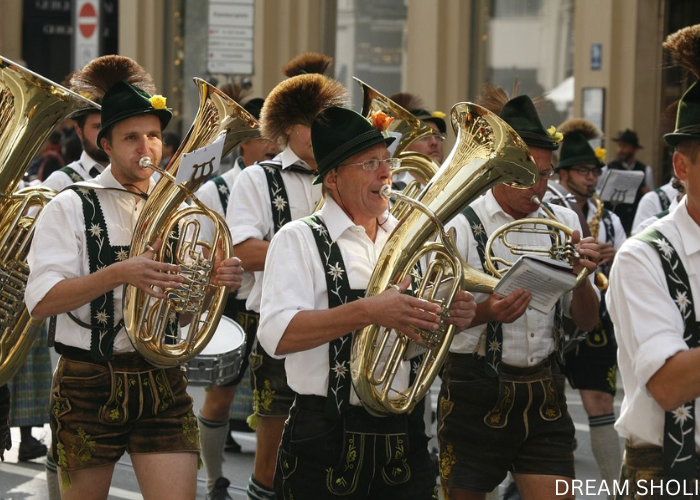
Berlin, Germany’s dynamic capital, is a city steeped in rich history, vibrant culture, and creative energy. It is home to some of the world’s most iconic landmarks, including the Brandenburg Gate, the remnants of the Berlin Wall, and the UNESCO-listed Museum Island, which houses several world-class museums. The city’s cultural diversity and innovative spirit are evident in its art scene, music festivals, and thriving nightlife, making it a popular destination for travelers seeking a blend of historical exploration and modern urban experiences. For those arriving by air, Berlin has two major airports that cater to international and domestic travelers. Berlin Tegel Airport, located in the northwest of the city, was a key gateway for both domestic and international flights for decades. Although it has now been replaced by the new Berlin Brandenburg Airport, Tegel still holds significance as a historical airport and is a symbol of Berlin’s post-reunification growth.
The newest addition to Berlin’s aviation infrastructure, Berlin Brandenburg Airport (BER), officially replaced Tegel as the city’s primary international airport. Situated to the south of the city, Berlin Brandenburg is a modern, state-of-the-art facility designed to accommodate the increasing number of travelers to the city. As the main hub for international and domestic flights, BER connects Berlin to destinations around the world with ease. Its advanced amenities and expansive terminals make it a convenient and comfortable entry point for those visiting the German capital. Together, these airports make Berlin highly accessible, ensuring that travelers from across the globe can experience the city’s compelling mix of historical significance and contemporary vitality.
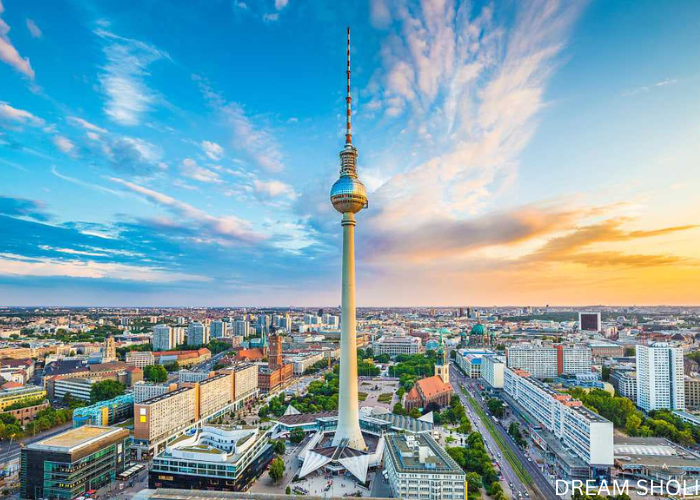
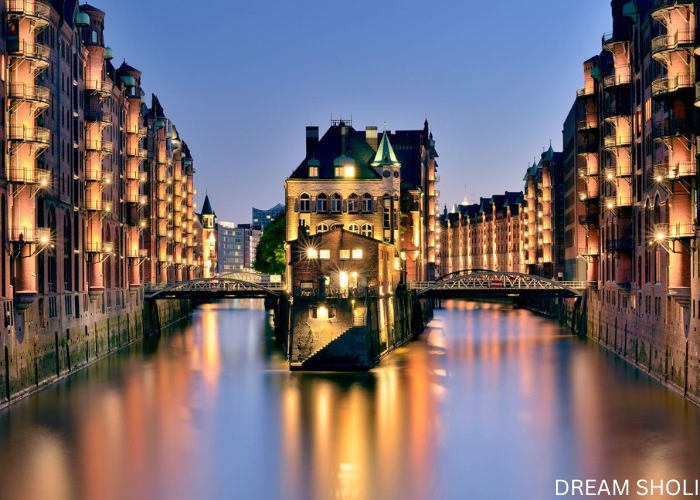
Hamburg, Germany’s second-largest city, is a thriving port metropolis renowned for its maritime legacy, dynamic cultural scene, and impressive architectural landmarks. Situated on the Elbe River, Hamburg offers a unique blend of historical charm and contemporary flair, making it a captivating destination for travelers. The city’s rich maritime history is evident in its iconic port, one of the busiest in Europe, as well as in the historic Speicherstadt district, the world’s largest warehouse complex. The area’s red-brick warehouses, canals, and cobblestone streets evoke a sense of the city’s bygone era while being surrounded by modern shops, cafes, and galleries. One of Hamburg’s most vibrant areas is the Reeperbahn, an entertainment hub known for its lively nightlife, theaters, and music venues. The street is a testament to the city’s reputation as a cultural hotspot, where visitors can enjoy everything from live concerts to a variety of bars and restaurants. Another notable feature of Hamburg is the beautiful Alster lakes, offering picturesque views and recreational opportunities such as boating and walking trails amidst tranquil surroundings. Hamburg’s culinary scene is equally diverse, offering a wide array of international and local flavors. From fresh seafood caught in the North Sea to classic German dishes, the city has something to satisfy every palate. Visitors can explore bustling food markets or dine at one of its many Michelin-starred restaurants. The city is well-connected internationally by Hamburg Airport (HAM), which serves as a major gateway for travelers heading to and from the city. Located just 8.5 kilometers from the city center, Hamburg Airport provides convenient access to the city and surrounding areas. It offers both domestic and international flights, with excellent amenities and services to ensure a seamless travel experience. Whether arriving for business or leisure, the airport is an ideal starting point for exploring Hamburg’s many cultural, historical, and modern attractions.
Frankfurt, officially known as Frankfurt am Main, is a dynamic and multifaceted city in Germany, renowned as the country’s financial hub. As the home of the European Central Bank, Frankfurt plays a pivotal role in the global economy. The city’s skyline, characterized by towering skyscrapers, reflects its importance as a leading financial center, while also offering a modern, cosmopolitan atmosphere. In terms of air travel, Frankfurt is served by two major airports. The primary gateway to the city is Frankfurt Airport (FRA), one of the busiest airports in Europe and a major international hub. It offers a wide array of both domestic and international flights, connecting travelers to destinations around the world. With its extensive facilities, Frankfurt Airport provides a seamless travel experience, catering to millions of passengers each year.
Another notable airport is Frankfurt-Hahn Airport, located approximately 120 kilometers from the city center. Despite its name, Frankfurt-Hahn is not directly in Frankfurt but serves as a secondary airport primarily for low-cost airlines. It is a popular choice for budget-conscious travelers seeking affordable flights to and from the region. Beyond its financial prowess, Frankfurt is also a city of rich cultural offerings. Visitors can explore Römerberg, the historic town square with its picturesque medieval buildings, and the Palmengarten, a lush botanical garden showcasing exotic plants. Art enthusiasts will appreciate the Städel Museum, which houses an impressive collection of European art. The city’s blend of modern finance, cultural heritage, and historical landmarks makes Frankfurt a compelling destination for travelers from all over the world.
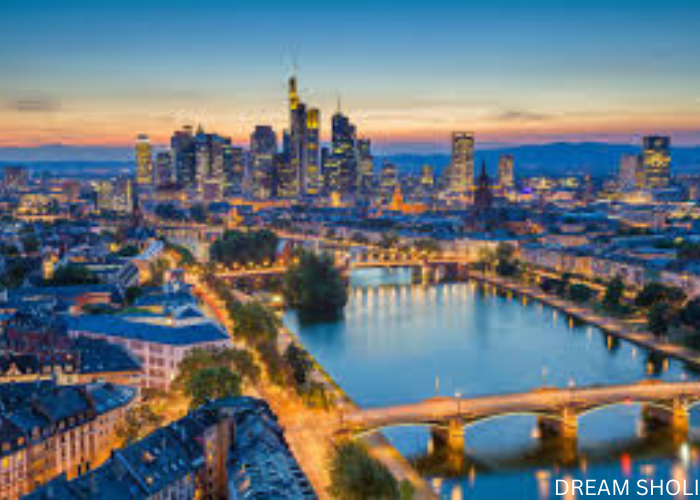

Explore the world effortlessly with our tailored travel packages. Let us handle the details while you create unforgettable memories.
Copyright 2024 Dream Sholi